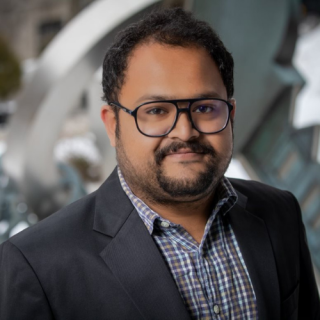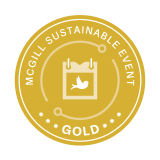
Hosted on March 30, 2022 | 5:30 PM - 7:30 PM (EST)
Free In-Person Event | Location: The McGill Faculty Club: 3450 McTavish Street, Montreal, Quebec H3A 0E5
A TISED initiative, SEDTalks! is an educational and skill-building series for graduate students in the Faculty of Engineering whose research advances sustainability in the areas of engineering and design. The SEDTalks! Event features TEDTalk-style presentations from three graduate students, our ChangeMakers, followed by a live Q&A. Sponsored by WSP.
Full video below:
|
Meet our 2022 ChangeMakers: |
||
|---|---|---|
 |
 |
 |
| Anirban Kundu | Valerie Lamenta | Galih Suwito |
|
Civil Engineering, Ph.D. Candidate SUPV: Prof. Subhasis Ghoshal, Ph.D. Sustainable Industrial Processes and Manufacturing |
Mechanical Engineering, M.Sc. Candidate SUPV: Prof. Melanie Tetreault-Friend Ph.D. Renewable Energy & Energy Efficiency |
Mining and Materials Engineering, Ph.D. Candidate SUPV: Prof. Nate Quitoriano, Ph.D. Renewable Energy and Energy Efficiency |
| In search of an affordable, natural way to clean up the over 4000 sites contaminated by diesel in Canada | Shedding solar light on molten salt behaviour: the path towards 24/7 renewable energy | Bringing photonics into silicon to make your cloud greener |
| Presently, there are several thousand diesel-contaminated sites in sub-Arctic Canada. Bioremediation is a sustainable approach that utilizes the soil’s indigenous bacteria to degrade diesel to less toxic intermediates; however, its success rate is inconsistent. Current bioremediation practices rely on nutrient addition but do not consider bio-accessibility limitations. By analyzing different sub-Arctic soils to identify correlations between bioremediation success and sub-micron microhabitats and soil microbiology, Anirban’s research addresses this gap. Future implications of this research will assist practitioners in using bioaccessibility in addition to nutrient requirements to increase bioremediation success |
Dependable access to energy is key to improving people’s living standards; energy produces food, provides shelter, permits transport, and enables societal development. In order to achieve a sustainable future, the path forward must decrease our carbon footprint while also meeting our ever-increasing energy demands. However, current renewable solutions, such as solar energy, often cause significant variability in the power supply curve. By employing molten salts, a high-temperature fluid capable of both capturing and storing heat, it is possible to generate a more consistent power output from renewable sources. Valerie’s research seeks to develop a better understanding of the fluid flow and heat transfer phenomena occurring in molten salts through a specialized visualization technique. This knowledge will help increase the efficiency, reduce the cost, and improve the safety of molten salt systems. Gaining a deeper understanding of molten salt behaviour will accelerate the progress towards a sustainable energy future. |
Explosive data growth has placed an enormous demand on our networks, with the majority of the information transfer occurring within large data centres. As a result, conventional datacentres have high energy demands and over 40% of total energy consumption is utilized to remove the waste heat generated by the computers stored within these structures. To reduce wasted heat in computers and data centers, information can be communicated via light signals, such as in fiberoptics, instead of using electricity directly. Currently, silicon photonic chips, which enable light generation and detection, still rely on traditional chip bonding to integrate photonic components into silicon increasing costs and preventing their commercial viability. A novel integration technique, called metal-catalyzed lateral growth, has been developed as a promising alternative to integrate photonics into silicon chips directly. Galih’s research focuses on developing utilizing this technique to achieve direct lateral growth of various photonic materials on silicon with atomically precise characteristics. Realizing such an atomic 'LEGO set' could enhance chip performance for next-generation computing and communication and reduce the energy consumption and carbon footprint of datacentres |
The Faculty Club is accessible with a ramp on the north side of the building. For more information please contact tised [at] mcgill.ca

We are proud to announce that our event has been awarded d’Or Sustainable Event certification by the McGill Sustainable Events program run by the McGill Office of Sustainability.
Nous sommes fiers d’annoncer que notre événement a été certifié comme événement Gold par le programme Événements durables McGill du Bureau du développement durable de l’Université McGill.